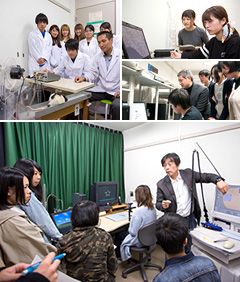Course of Psychology
Science of the mind.
How do humans feel, think, and behave?
There are many approaches to the mind, but psychology is a discipline that mainly studies the mechanisms and workings of the mind in a scientific manner to better understand human behavior.
The educational aim of our course is to cultivate students who "can gain a broad range of knowledge from the foundations of the field of psychology to applications and research methods so as to understand the various features of the human mind and behavior, and can elucidate social problems and psychological issues by empirical manner based on their acquired knowledge and methodology."
Examples of Graduate Thesis Topics
- Measurement of Blood Flow of the Occipital Region While Performing Inattentive and Attentive Tasks
- The Effect of the Opener Scale on the Validity of Self-Disclosure
- A Study of the Counting Behavior of Rats
- Search-Inducing Forgetfulness in Profile Language
| [Majors] | ê Psychology |
|---|
Psychology
Although research is carried out in many areas and topics in psychology today, the faculty in charge of the Course of Psychology curriculum at our university take a pure, fundamental, and scientific approach to the mechanisms and problems of the mind in the form of specialities such as cognitive psychology (cognition and memory processing of visual objects and phenomena), personality psychology (development of self and interpersonal relationships during adolescence), experimental psychology and physical psychology (characteristics of sense and perception, measurement of psychometrics), cognitive science and brain science (study of cognitive processes and intracerebral mechanisms), the psychology of learning and comparative cognitive psychology (study of cognitive processes mainly in animals), and health psychology (study of strategies for preventing and correcting powerlessness in schoolchildren and college students).
The main instruction is a series of lectures on Introduction to Psychology, lectures and exercises on basic knowledge of the various fields of psychology and the latest topics, etc. Also in your sophomore year, you study the basic concepts and techniques of psychological research, such as "basic experimentation," "basic practice," and "statistical methods." In your junior year, you learn advanced experimental research methods and investigation methods, and take on the challenge of experiments and investigations based on your interests. In your senior year, you bring together your research in a "graduation thesis." Once you have registered in the standard coursework of the major, you may apply for certification by the Japanese Psychological Association as a "JPA Certified Psychologist. "Psychology significantly involves the social sciences and disciplines such as developmental science, linguistics, and engineering. Persons who study psychology must have diverse viewpoints on people, and study related fields.
Teaching Staff


